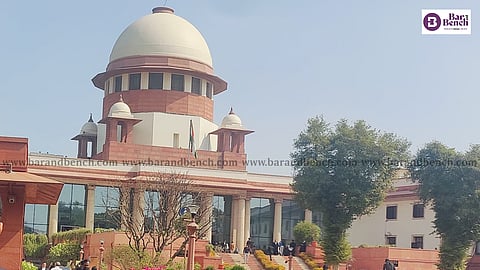
- Latest Legal News
- News
- Dealstreet
- Viewpoint
- Columns
- Interviews
- Law School
- Legal Jobs
- हिंदी
- ಕನ್ನಡ

The Supreme Court recently clarified the scope of Section 66(4) of the Railways Act, 1989, under which the Railways can impose penalties if there is any false declaration in consignments of goods sent through the Indian railways [Union of India v. M/s Kamakhya Transport Pvt. Ltd. Etc. Etc.].
The Court has held that the Railways can collect the correct charges for such consignments before or even after the delivery of the goods.
A Bench of Justice Sanjay Karol and Justice Prashant Kumar Mishra observed that Section 66(4) does not specify whether charges must be levied before or after delivery, indicating legislative intent to permit recovery at either stage.
"It is borne from the above that a consignee/owner of goods/person having charge of goods who has brought goods for the purpose of carriage has to give the Railway authorities a written statement regarding the description of the goods, to enable them to charge the appropriate rate of carriage. Under sub-section (4), if the statement is found to be materially false, the Railway authority is empowered to charge the goods at the required rate. No reference is made to the stage at which such a charge can be made, i.e., either before or after delivery. Consequently, it can be seen that the legislative intent had to be, to permit levy of charge under this Section, at either stage and not at a specific one," the Court said.
The Court was hearing a batch of appeals filed by the Central government against a 2021 order of the Gauhati High Court, which held that railway authorities are not entitled to recover charges for misdeclared goods after the delivery of such goods.
The dispute stemmed from demand notices issued by the Railways in 2011 and 2012 against Kamakhya Transport Pvt. Ltd. and others (respondents), alleging that they had made misdeclarations in relation to consignments booked through Indian Railways.
The respondents paid the amounts under protest and later approached the Railway Claims Tribunal seeking a refund, contending that charges under Section 66 (4) of the Railways Act could not be levied post-delivery.
The Tribunal accepted this contention, placing reliance on the Gauhati High Court’s earlier ruling in Union of India v. Megha Technical & Engineers Pvt. Ltd., and held that under Sections 73 and 74 of the Act, punitive charges must be raised prior to delivery.
The High Court upheld this view, relying on Jagjit Cotton Textile Mills v. Chief Commercial Superintendent NR, wherein it was held that punitive charges are required to be raised by the Railway authorities before the delivery of goods.
Disagreeing with the High Court’s interpretation, the Supreme Court clarified that Section 66—which specifically deals with misdeclaration—does not contain any restriction on when the correct charges for misdeclared consignments can be collected.
The Court further distinguished the case from cases falling under Sections 73 and 78 of the Railways Act. These provisions allow the Railways to recover additional charges if a person loads goods in a wagon beyond its permissible carrying capacity. These provisions explicitly require the Railways to levy the additional charges before the goods are delivered.
In contrast, Section 66 operates independently and allows the Railways to impose charges for materially false declarations, even after the delivery of goods, the Court found.
The Court also rejected the respondents’ claim that the demand notices were not genuine, observing that no evidence had been led to dispute their authenticity.
Allowing the appeals, the Supreme Court held that the Railway authorities acted within their powers under Section 66(4) and restored the demand notices.
Accordingly, the orders of the Gauhati High Court and the Railway Claims Tribunal were set aside.
Additional Solicitor General KM Nataraj and Advocates Ameyavikrama Thanvi, Vatsal Joshi, BK Satija, Chinmayee Chandra, Gaurang Bhushan, Amrish Kumar and Sudarshan Lamba appeared for the appellants (Union of India).
Advocates Divyansh Rathi, KP Maheshwari, Divyam Rathi and Gunjan Kumar appeared for the respondents.
[Read Judgement]